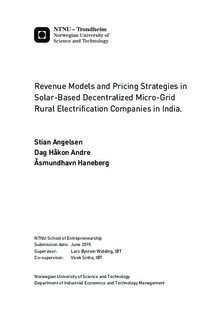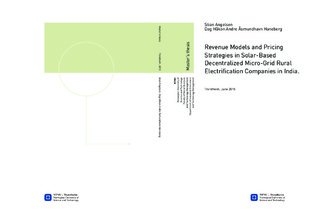| dc.description.abstract | A development tool for revenue models and pricing strategies in solar-based decentralized micro-grid rural electrification in India is developed by the authors. The basis for the revenue model development tool is an extensive literature review followed by a qualitative field study of four case companies in India, including interviews of customers in a total of four villages. The proposed development tool may be used by existing and new micro-grid companies that wish to develop their revenue model in the context of rural India.
There is a need to develop financially sustainable solutions that can provide 450 million people in rural areas of India with electricity. Decentralized systems pose as the most viable solution due to lower costs and higher quality of electricity in rural areas. Most current systems use diesel generators, but renewable energy technologies such as hydro, wind, biomass, and solar are better solutions, where solar has the largest unutilized potential in India. Renewable energy rural projects currently are highly subsidy dependent and object to considerable challenges related to financial sustainability, slowing the development. Higher operational profits are expected to attract more businesses and speed up the electrification process. This is often done by reducing costs or increasing revenues, which can be addressed by the revenue model of the company.
The study starts by reviewing literature in two main fields of interest: The first field is existing theories regarding revenue models and pricing strategies. The second field is contextual literature on solar-based decentralized micro-grid rural electrification. The result of the literature review is an initial construct that acts as a guideline for the qualitative case study.
The findings from the qualitative case study confirm and elaborate the initial revenue model construct. The authors found that the process of revenue model development varies between the case companies, and that the companies continuously change and improve their revenue model. The authors have therefore created a tool that allows learning and changes in the revenue model. The tool consists of two parts; the revenue model structure, and a set of revenue model ideas to address contextual challenges.
The contextual study has led to revenue model implications that contribute to the theory on revenue models in the context. Through a discussion on generalization, the authors suggests that the revenue model structure can be generalized to the context of utilities, and that the revenue model ideas can be generalized to the context of renewable energy decentralized micro/mini/village-grids in India.
The authors propose a learning-based model that can be adapted to different contexts. This study contributes to the revenue model theory in this context by proposing (1) a revenue model structure, (2) a learning-based mechanism for revenue model development, and (3) that revenue collection (transaction method, collection method, and control method) is part of the revenue model structure. | |

